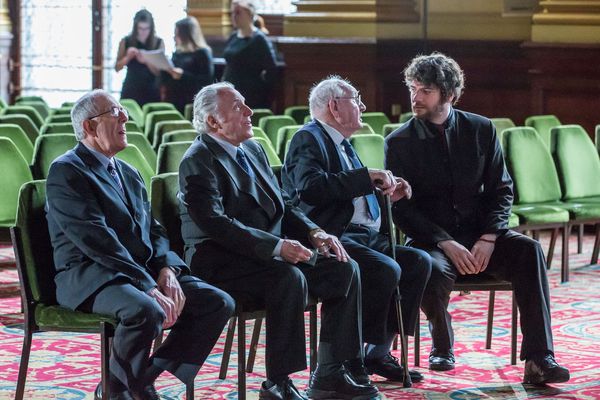 |
| Form left to right: John Keenan, Robert Somerville, Bob Fulton and Felipe Bustos Sierra |
The story of Scottish factory workers who refused to work on engines destined for Chilean fighter planes during the early years of the Pinochet regime, Nae Pasaran is a small film taking on a big topic. Since making it, director Felipe Bustos Sierra has uncovered a lot more of the story, and he’s trying to raise funds so he can create a feature length version. We caught up with him to find out more about his plans, about the hidden history he uncovered, and about how it all began.
“I first heard the story a long time ago, when I was kid,” he began. “I’m a filmmaker in Scotland and I had made three fiction shorts, so I was wanting to tell a story, to make a documentary for the Scottish Documentary Institute. Actually, there were two possibilities at that point; the other one was Bridging the Gap. I didn’t think there was anyone still alive from back then because it was so long ago, so I wrote it as a fiction short first. Then I got a call from Robert, who was the worker most involved in the boycott and in keeping it alive in the media over all that time. I also spoke to John, the youngest one, who mostly worked behind the scenes and dealt with management.
“To begin with it wasn’t an official boycott, they were just refusing to work on the engines and they expected to be fired for it. In the end they got the support of the whole country behind them. John was really happy to talk because basically he hadn’t had chance talk about it for 40 years and he’d never found out what happened with it all. When we first met I knew almost more than he did.”
Having met the men, Felipe knew he had to tell the story, but putting it all together was still a challenge – particularly because the funding arrangements meant he had just three months in which to do so, and he wanted to make part of it using animation. Nevertheless, the result has made quite a impact..
 |
| Nae Pasaran |
“”I was expecting it to get a really good reaction from people who were involved in the story and people like myself, second generation Chileans and refugees,” he explained, “but it’s been to over 40 film festivals now and it’ won a couple of awards, so it’s been really great. I think there’s definitely a connection that goes beyond Chile and Scotland, and it also opened so many doors in terms of access to information and tangible evidence. A lot of people had thought the story was just one of the rumours, the tall tales told to boost morale during the dictatorship.”
He was clearly deeply moved by the response of Chilean audiences, even though it was mixed. This, and the material he began to collect as more and more people got in touch to share what they knew about what had happened, made him determined to work on a longer film that could tell a fuller version of the story. It is, he says, a very different beast. “The new film is more about the momentum, the idea of what can happen when a small action becomes something much larger or part of something larger that transcends completely the initial gesture. It’s about following three guys throughout the four years when they lived in the dark as to what was accomplished by their action. In the end they received the highest civilian honour from the Chilean government.”
It matters all the more, he explained, because it’s about people whose history has never been told in schools. “Kids just learn that there was a change in government in 1973, and then move on.
“There were 15 years of pretty brutal censorship. The military regime was trying to legitimise itself and it knew that the quickest way was to be in charge of education and make sure nothing got told.” Those who resisted the regime, he explained, are still portrayed as if they were “all a bunch of Communists.” When he started his fundraising campaign he received abuse in Chile from people who insisted he was just making it all up, even though it was based on evidence from the National Archives in London and in Santiago. Despite this, the campaign is on track and he hopes to start filming in Scotland very soon so he can try and have the film ready in time for .the festivals next Spring. “I’m quite excited to see what else I’m going to find out,” he said.
The feature film will answer some of the questions raised by the short, revealing the ultimate fate of the engines and the story of their journey to Chile, which Felipe described as “absolutely surreal, the stuff of thrillers.” He wanted to become a filmmaker from the age of 12, he explained, and he was always intrigued by this particular story because it was told in so many different ways by different people. “It permeated my childhood.”
As a filmmaker, he was always been driven by a passion for uncovering the truth, and to be able to do so with this story 40 years on is a thrilling experience – a happy ending for his own story. It has also led him to uncover many others. “just three weeks ago I heard from someone in Chile who had been part of the Air Force. He’d spent time in prison because he refused to take part in the coup and then he was suddenly released to the UK. He was told he was being traded for some engines and until now he never knew what that was about.” Although he doesn’t expect to get much support for the film from the predominantly right wing Chilean media, Felipe noted that the Chilean government was very accommodating, giving him access to places where film crews have not generally been allowed, because they see it as an important part of the preservation of the country’s heritage. “I hope Chilean people will support it in cinemas,” he said.
If you would like to contribute to Felipe’s fundraising efforts, you can do so here.





















